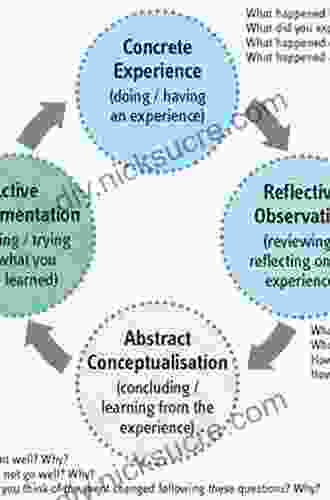Study Skills for Master's Level Students: A Comprehensive Guide to Optimize Learning and Elevate Academic Excellence

Embarking on a master's degree program signifies a commitment to intellectual growth and professional advancement. To navigate the rigors of graduate-level studies, students must equip themselves with a robust foundation of study skills. This article serves as an indispensable guide, providing a comprehensive overview of effective study strategies tailored to the unique demands of master's level education.
1. Active Reading: Engage with the Material on a Deeper Level
- Highlight and annotate key points to stimulate critical thinking.
- Question the author's perspectives, offering alternative insights.
- Break down complex concepts into manageable chunks for better comprehension.
2. SQ3R: A Structured Approach to Textbook Navigation
4.6 out of 5
| Language | : | English |
| File size | : | 1526 KB |
| Text-to-Speech | : | Enabled |
| Enhanced typesetting | : | Enabled |
| Screen Reader | : | Supported |
| Print length | : | 167 pages |
- Survey: Preview the chapter or section, noting headings and subheadings.
- Question: Formulate questions about the material to guide your reading.
- Read: Engage actively with the text, seeking answers to your questions.
- Recite: Summarize the key points in your own words.
- Review: Regularly revisit the material to reinforce retention.
3. Spaced Repetition: Enhance Long-Term Memory
- Review new material at increasing intervals (e.g., 1 hour, 1 day, 1 week).
- This technique strengthens neural pathways, facilitating long-term retention.
- Use flashcards, summaries, or practice questions for effective spaced repetition.
4. Note-Taking: Capture Key Information Effectively
- Choose a note-taking method that complements your learning style (e.g., Cornell, outlining, mind mapping).
- Condense the material into concise notes, focusing on main ideas.
- Use abbreviations and symbols to streamline note-taking without sacrificing clarity.
5. Concept Mapping: Visualize Interconnections
- Create graphical representations of relationships between concepts.
- This technique aids in understanding complex theories and identifying patterns.
- Use different colors, shapes, and lines to enhance visual impact.
6. Discussion Groups: Collaborate for Enhanced Understanding
- Engage in regular discussions with classmates to share insights and challenge perspectives.
- Participate actively, asking questions and contributing your own ideas.
- Collaborative learning fosters deeper understanding and promotes critical thinking.
1. Prioritize Tasks: Focus on the Most Important Activities
- Use a to-do list or digital task manager to keep track of assignments and deadlines.
- Identify high-priority tasks and allocate time accordingly.
- Break down large assignments into smaller, manageable chunks.
2. Plan a Study Schedule: Create a Structured Routine
- Establish a regular time each day for studying, even on weekends.
- Schedule specific blocks for different subjects or activities.
- Stick to your schedule as much as possible to maintain consistency and avoid procrastination.
3. Utilize Technology: Enhance Efficiency and Engagement
- Note-taking apps, digital flashcards, and online study groups can streamline your workflow.
- Use productivity tools to track your progress and stay organized.
- Research and utilize apps or software that cater specifically to graduate-level studies.
4. Minimize Distractions: Create a Conducive Study Environment
- Choose a quiet and distraction-free space for studying.
- Eliminate unnecessary noise, clutter, and potential interruptions.
- Use noise-canceling headphones or white noise to minimize distractions.
5. Take Breaks: Regular Intervals for Mental Refreshment
- Step away from your studies every 45-60 minutes for short breaks.
- Engage in activities that revitalize you, such as going for a walk, listening to music, or socializing.
- Regular breaks improve focus and prevent burnout.
1. Develop a Questioning Mindset: Engage with Curiosity
- Constantly ask questions about the material you're studying.
- Challenge assumptions and explore alternative perspectives.
- Seek clarification from your professors, classmates, or other resources.
2. Analyze and Synthesize: Go Beyond Surface-Level Understanding
- break down complex ideas into their component parts.
- Identify relationships between different concepts and theories.
- Formulate original insights and arguments based on your analysis.
3. Use Inductive and Deductive Reasoning: Enhance Logical Thinking
- Inductive reasoning: Draw s based on specific observations.
- Deductive reasoning: Apply general principles to specific cases.
- Practice both types of reasoning to develop a well-rounded analytical approach.
4. Practice Problem-Solving: Develop Strategic Solutions
- Identify the problem and define the goal clearly.
- Explore different solution strategies and evaluate their feasibility.
- Implement the chosen solution and assess its effectiveness.
5. Seek Feedback: Embrace Constructive Criticism
- Ask for feedback from your professors, classmates, or peers on your work.
- Be open to constructive criticism and use it to improve your understanding and performance.
- Feedback provides valuable insights and helps you identify areas for improvement.
- Attend lectures regularly and actively engage with the material.
- Take advantage of office hours to seek clarification and discuss topics further.
- Collaborate with classmates to form study groups and support each other.
- Visit the library and utilize online databases for research and resource gathering.
- Maintain a balanced lifestyle that includes regular exercise, healthy饮食, and adequate sleep.
- Remember that learning is a continuous journey. Embrace challenges as opportunities for growth and self-improvement.
Mastering effective study skills is essential for academic success at the graduate level. By implementing the strategies outlined in this article, students can optimize their learning, enhance their retention, and develop the critical thinking skills necessary for academic excellence. Embracing curiosity, seeking feedback, and maintaining a balanced lifestyle will further contribute to a fulfilling and gratifying educational experience. Remember, the pursuit of knowledge is a lifelong endeavor, and the skills you acquire during your master's program will serve you well throughout your professional and personal journey.
4.6 out of 5
| Language | : | English |
| File size | : | 1526 KB |
| Text-to-Speech | : | Enabled |
| Enhanced typesetting | : | Enabled |
| Screen Reader | : | Supported |
| Print length | : | 167 pages |
Do you want to contribute by writing guest posts on this blog?
Please contact us and send us a resume of previous articles that you have written.
 Fiction
Fiction Non Fiction
Non Fiction Romance
Romance Mystery
Mystery Thriller
Thriller SciFi
SciFi Fantasy
Fantasy Horror
Horror Biography
Biography Selfhelp
Selfhelp Business
Business History
History Classics
Classics Poetry
Poetry Childrens
Childrens Young Adult
Young Adult Educational
Educational Cooking
Cooking Travel
Travel Lifestyle
Lifestyle Spirituality
Spirituality Health
Health Fitness
Fitness Technology
Technology Science
Science Arts
Arts Crafts
Crafts DIY
DIY Gardening
Gardening Petcare
Petcare Winston Starr
Winston Starr Matthew J Friedman
Matthew J Friedman Stephen R Lawhead
Stephen R Lawhead Jonathan S Rose
Jonathan S Rose Jack Grimshaw
Jack Grimshaw Catherine Stonehouse
Catherine Stonehouse Yasu
Yasu Sarah Sutton
Sarah Sutton Jim Allen
Jim Allen Dame Darcy
Dame Darcy Erin Watt
Erin Watt Corina Morariu
Corina Morariu Angela Himsel
Angela Himsel Dane Huckelbridge
Dane Huckelbridge Soap2day Publication
Soap2day Publication Rysa Walker
Rysa Walker Bill Jones
Bill Jones Jane Austen
Jane Austen Anne Deans
Anne Deans Lindsey Lapointe
Lindsey Lapointe Caspar Craven
Caspar Craven Timothy C Urdan
Timothy C Urdan Natalie Pompilio
Natalie Pompilio Rick Telander
Rick Telander R A Mejia
R A Mejia Sarah Jo Brown
Sarah Jo Brown Zen Lylah
Zen Lylah Anji Andrews
Anji Andrews George Francis Dow
George Francis Dow Roxanne Martin
Roxanne Martin Todd Rose
Todd Rose Dr Howard Rankin
Dr Howard Rankin Kathlyn Gay
Kathlyn Gay A M Wilson
A M Wilson Jonalu Johnstone
Jonalu Johnstone William Bauer
William Bauer Helen E Johnson
Helen E Johnson A J Mackenzie
A J Mackenzie Tsao Lin E Moy L Ac Msom
Tsao Lin E Moy L Ac Msom Byron Pitts
Byron Pitts John Almberg
John Almberg Jennifer Senior
Jennifer Senior Chris I Naylor
Chris I Naylor A R Vasishtha
A R Vasishtha Len Fisher
Len Fisher Dirk F Moore
Dirk F Moore Barry Werth
Barry Werth Kenay Keira
Kenay Keira Dr Tricia Groff
Dr Tricia Groff Carrie Harper
Carrie Harper Kenneth Cline
Kenneth Cline Randy Friedman
Randy Friedman Rachael Allen
Rachael Allen Tiara R Brown
Tiara R Brown Raymonde Carroll
Raymonde Carroll Scott A Ostrow
Scott A Ostrow A L Graziadei
A L Graziadei Bree Moore
Bree Moore Lillian Tibbles Phd
Lillian Tibbles Phd Joe Pepitone
Joe Pepitone Roger Zelazny
Roger Zelazny Vernon Trafford
Vernon Trafford Saxton Pope
Saxton Pope Lou Zambello
Lou Zambello Charles Edward Chapel
Charles Edward Chapel Leigh Newman
Leigh Newman Mrjamvad
Mrjamvad Lou Tabory
Lou Tabory Max Tegmark
Max Tegmark Jennifer L Armentrout
Jennifer L Armentrout Kelly Starrett
Kelly Starrett Peter Goldenthal
Peter Goldenthal W Timothy Gallwey
W Timothy Gallwey Todd Wanerman
Todd Wanerman Matthieu Ricard
Matthieu Ricard Sandra Swenson
Sandra Swenson Eileen Tracy
Eileen Tracy Fernanda Pirie
Fernanda Pirie Dr Stephanie Bloodworth Psyd
Dr Stephanie Bloodworth Psyd Freya Hoffmeister
Freya Hoffmeister David Remnick
David Remnick A J Hamler
A J Hamler Charles Butler
Charles Butler Sharie King
Sharie King John Williams
John Williams Ari Tuckman
Ari Tuckman Abigail Burd Lcsw Pmh C
Abigail Burd Lcsw Pmh C Philip Yarrow
Philip Yarrow King Solomon
King Solomon Lisa Murphy
Lisa Murphy Philip Golding
Philip Golding Crystal Cestari
Crystal Cestari William C Oakes
William C Oakes Virginia Willis
Virginia Willis Thomas Hager
Thomas Hager Sherrilyn Kenyon
Sherrilyn Kenyon Sergey Kosarevsky
Sergey Kosarevsky Karl Knopf
Karl Knopf Akash Kapur
Akash Kapur Ridge Magee
Ridge Magee Eugene Don
Eugene Don A G Cairns Smith
A G Cairns Smith David Deutsch
David Deutsch Elisabeth Fassas
Elisabeth Fassas Jon Gillespie Brown
Jon Gillespie Brown Andrew Henderson
Andrew Henderson Charles Szypszak
Charles Szypszak Marc S Sabatine
Marc S Sabatine Linh Phung
Linh Phung Loretta Sponsler
Loretta Sponsler Susan Cooper
Susan Cooper Thomas Mcguane
Thomas Mcguane Anna Goldsworthy
Anna Goldsworthy Peter Shelton
Peter Shelton Stan Tenen
Stan Tenen Seth M Holmes
Seth M Holmes Chelsea Crockett
Chelsea Crockett A G Howard
A G Howard Jamie Vardy
Jamie Vardy Lyla Lee
Lyla Lee Sam Warburton
Sam Warburton A M Strickland
A M Strickland Sean Skahan
Sean Skahan Mike Tidwell
Mike Tidwell Gary Gruber
Gary Gruber Josh Skeen
Josh Skeen A K Davidson
A K Davidson Andreas Quast
Andreas Quast Valerio Varesi
Valerio Varesi Ryan Gray
Ryan Gray Steve Hindman
Steve Hindman Sandra Niche
Sandra Niche A J Messenger
A J Messenger Boston T Party
Boston T Party John L Messina
John L Messina Rekha Ramcharan
Rekha Ramcharan Sherine Hamdy
Sherine Hamdy Michael Labossiere
Michael Labossiere Marlynn Jayme Schotland
Marlynn Jayme Schotland Ken Alder
Ken Alder Nick Jackson
Nick Jackson Filippo Coarelli
Filippo Coarelli Susan Striker
Susan Striker Jeff Kane
Jeff Kane Pete Ripmaster
Pete Ripmaster Eric Blehm
Eric Blehm Din Daniels
Din Daniels Micha Gorelick
Micha Gorelick Christopher Small
Christopher Small Noah Gift
Noah Gift Val Mcdermid
Val Mcdermid Pardha S Pyla
Pardha S Pyla N J Enfield
N J Enfield Robert P Harris
Robert P Harris Niall Ferguson
Niall Ferguson Dmv Test Bank
Dmv Test Bank Rafe Esquith
Rafe Esquith Ed Webster
Ed Webster Alyssa Padgett
Alyssa Padgett Alf Wilkinson
Alf Wilkinson Joel David Hamkins
Joel David Hamkins Christiane Kutik
Christiane Kutik Heather Gudenkauf
Heather Gudenkauf Zander Brumbaugh
Zander Brumbaugh Alison Cotter
Alison Cotter Richard Heath
Richard Heath Laura Pohl
Laura Pohl Tom Jordan
Tom Jordan Christine Wheeler
Christine Wheeler A H Almaas
A H Almaas Heather Anderson
Heather Anderson David A Wells
David A Wells Eric Armstrong
Eric Armstrong Barbara J Bain
Barbara J Bain Francis Fukuyama
Francis Fukuyama Gabrielle Coleman
Gabrielle Coleman Bruce Lansky
Bruce Lansky Brian Clegg
Brian Clegg Todd Downs
Todd Downs Lyndall Clipstone
Lyndall Clipstone Helen Buckley
Helen Buckley Cynthia Ulrich Tobias
Cynthia Ulrich Tobias Val Emmich
Val Emmich Dale Dougherty
Dale Dougherty Leandro Taub
Leandro Taub Michael D Coogan
Michael D Coogan Jonathan Mckee
Jonathan Mckee William Minto
William Minto Lauren Oliver
Lauren Oliver David J Vanbergen Jr
David J Vanbergen Jr Sky Marsen
Sky Marsen Helen Marot
Helen Marot A L Knorr
A L Knorr Aaron Kleinmeyer
Aaron Kleinmeyer Marks Prep
Marks Prep Rebecca Pelky
Rebecca Pelky Jamal Moustafaev
Jamal Moustafaev Nicole Conway
Nicole Conway Jordan B Peterson
Jordan B Peterson William F Mann
William F Mann Arlin Smith
Arlin Smith Joshua Akin
Joshua Akin Homeira Qaderi
Homeira Qaderi William Monk
William Monk Diane Stresing
Diane Stresing A Roger Ekirch
A Roger Ekirch Calvin L Chou
Calvin L Chou Gordon Macquarrie
Gordon Macquarrie Dan Romanchik Kb6nu
Dan Romanchik Kb6nu Brad K Chambers
Brad K Chambers Lilin Yang
Lilin Yang Andrea Falk
Andrea Falk Bear Heart
Bear Heart Rosie Garthwaite
Rosie Garthwaite Megan Vickers
Megan Vickers Karla Helbert
Karla Helbert Olivia Smith
Olivia Smith Dr Alan Whitcomb
Dr Alan Whitcomb Jan Morris
Jan Morris Lisa Pease
Lisa Pease Mike Branon
Mike Branon Larit Levy
Larit Levy Sadie Robertson Huff
Sadie Robertson Huff Matt Brown
Matt Brown John Long
John Long Bob Frye
Bob Frye Anne Sigismund Huff
Anne Sigismund Huff Peter Godfrey Smith
Peter Godfrey Smith Don Fink
Don Fink Tammara Webber
Tammara Webber Chris Diamond
Chris Diamond Vitaly Pedchenko
Vitaly Pedchenko James Baldwin
James Baldwin David Spiegelhalter
David Spiegelhalter Michael Shingleton
Michael Shingleton Frost Kay
Frost Kay Raymond M Smullyan
Raymond M Smullyan Monte Burke
Monte Burke Catherine Rodgers
Catherine Rodgers David G Taylor
David G Taylor Cassandra Clare
Cassandra Clare Tim Flanagan
Tim Flanagan Iasha King
Iasha King Katrina Abbott
Katrina Abbott Shauna Lynn Panczyszyn
Shauna Lynn Panczyszyn K A Riley
K A Riley Ray Ordorica
Ray Ordorica Lauren Muhlheim
Lauren Muhlheim Peter Zheutlin
Peter Zheutlin Michael Lanza
Michael Lanza Steven Raichlen
Steven Raichlen Matilda Ramsay
Matilda Ramsay Susanne Foitzik
Susanne Foitzik William Scott Wilson
William Scott Wilson Ray Bradbury
Ray Bradbury Joe Navarro
Joe Navarro Dan Limbaugh
Dan Limbaugh David H Barlow
David H Barlow Tony Wright
Tony Wright Cailin O Connor
Cailin O Connor Roy Richard Grinker
Roy Richard Grinker William Ramsey
William Ramsey Cristian Salcescu
Cristian Salcescu The R A
The R A Cathy A Malchiodi
Cathy A Malchiodi Pintip Dunn
Pintip Dunn Russell Davis
Russell Davis Eric Sevareid
Eric Sevareid Bob Plager
Bob Plager Tanya Selvaratnam
Tanya Selvaratnam Anghel Leonard
Anghel LeonardA G
 Kathy Koch
Kathy Koch Dean R Johnson
Dean R Johnson Jennie Finch
Jennie Finch Blair Holden
Blair Holden David Magee
David Magee Giordano Scalzo
Giordano Scalzo Manoush Zomorodi
Manoush Zomorodi John L Parker Jr
John L Parker Jr Patrick Meechan
Patrick Meechan Sonya Chappell
Sonya Chappell Watt Key
Watt Key Glenn Patron
Glenn Patron Georgia Varozza
Georgia Varozza Garret Romaine
Garret Romaine Jean Philippe Dionne
Jean Philippe Dionne Kenn Bivins
Kenn Bivins Polly Moore
Polly Moore Armin A Brott
Armin A Brott Jim Vernes
Jim Vernes Gemma Milne
Gemma Milne Day Leitao
Day Leitao Michelle Maccarthy
Michelle Maccarthy Thomas R Martin
Thomas R Martin Lilith Mclelland
Lilith Mclelland Dr Kevin Leman
Dr Kevin Leman Bryan Berg
Bryan Berg Rens Bod
Rens Bod A J Stewart
A J Stewart Shenyang Guo
Shenyang Guo Jonathan Eig
Jonathan Eig Upton Sinclair
Upton Sinclair Linda Tuhiwai Smith
Linda Tuhiwai Smith Taha Sochi
Taha Sochi Mj Porter
Mj Porter Harrison Fluss
Harrison Fluss Jm Mason
Jm Mason Emily Evans
Emily Evans Kerri Hummingbird Sami
Kerri Hummingbird Sami Mark Ryan
Mark Ryan Cath Smith
Cath Smith Okina Baba
Okina Baba Diane Burke Fessler
Diane Burke Fessler Bruce Tremper
Bruce Tremper Lindsey Vonn
Lindsey Vonn Jennifer Longmore
Jennifer Longmore Mitch Landrieu
Mitch Landrieu Peter Rees
Peter Rees Chuck Whelon
Chuck Whelon Ken Castor
Ken Castor A J Mackinnon
A J Mackinnon Eva Mauer
Eva Mauer Scientia Media Group
Scientia Media Group A J Angulo
A J Angulo Paul Watzlawick
Paul Watzlawick Adam Savage
Adam Savage Businessnews Publishing
Businessnews Publishing Daniel S Pierce
Daniel S Pierce Paul Mccarthy
Paul Mccarthy Michael Dell
Michael Dell Walter Dean Myers
Walter Dean Myers Rina Kent
Rina Kent Bob Trueman
Bob Trueman Dawn Huebner
Dawn Huebner John D Currid
John D Currid Judi Garman
Judi Garman Meghan Leahy
Meghan Leahy Zen Faulkes
Zen Faulkes Anthony J Onwuegbuzie
Anthony J Onwuegbuzie Michael Lardon
Michael Lardon Amanda Ostrander
Amanda Ostrander Adrian Dater
Adrian Dater Peter Nichols
Peter Nichols John Mordechai Gottman
John Mordechai Gottman Hazel Holmes
Hazel Holmes Jennifer Trainer Thompson
Jennifer Trainer Thompson Nancy Mckenzie
Nancy Mckenzie Flo Perry
Flo Perry Certsquad Professional Trainers
Certsquad Professional Trainers Helen Fitzgerald
Helen Fitzgerald Toni Natalie
Toni Natalie Shelly Mazzanoble
Shelly Mazzanoble Harry Yoon
Harry Yoon Ilya Ru
Ilya Ru Dale P Clemens
Dale P Clemens Katerina Griffith
Katerina Griffith Raymond J Carroll
Raymond J Carroll E S Wynn
E S Wynn Mandy Rivers
Mandy Rivers Alex Karp
Alex Karp Jennifer N Smith
Jennifer N Smith Rebecca Black
Rebecca Black Marcus Butler
Marcus Butler Mark Obmascik
Mark Obmascik Leslie Stager
Leslie Stager Remy Agee
Remy Agee Kenneth Cloke
Kenneth Cloke A J Carlisle
A J Carlisle Amos Yong
Amos Yong Bruce Collier
Bruce Collier Hicham And Mohamed Ibnalkadi
Hicham And Mohamed Ibnalkadi Stan Skinner
Stan Skinner Todd Gitlin
Todd Gitlin Rebecca A Moyes
Rebecca A Moyes Jec Aristotle Ballou
Jec Aristotle Ballou Thomas C Tabor
Thomas C Tabor John Brenkus
John Brenkus Oba Ilari Aladokun
Oba Ilari Aladokun Joseph Mctaggart
Joseph Mctaggart Dave Lowry
Dave Lowry Russell Sher
Russell Sher Mia Kankimaki
Mia Kankimaki Louis Jacques Dorais
Louis Jacques Dorais Francis Pryor
Francis Pryor John Halligan
John Halligan Timothy J Gawne
Timothy J Gawne Cyndi Kinney
Cyndi Kinney Tripp Bowden
Tripp Bowden Jose M Forero Bautista
Jose M Forero Bautista Peter Maas
Peter Maas Steve Angers
Steve Angers Shanterra Mcbride
Shanterra Mcbride Kevin Adams
Kevin Adams Ken Dryden
Ken Dryden Grady Hendrix
Grady Hendrix Susan Aud Sonders
Susan Aud Sonders Lucy Christopher
Lucy Christopher A F Stewart
A F Stewart Alexander Greenmaj
Alexander Greenmaj
Light bulbAdvertise smarter! Our strategic ad space ensures maximum exposure. Reserve your spot today!

 Harold BlairDiscover the Ultimate Bonding Experience: Build It With Dad, Where Memories...
Harold BlairDiscover the Ultimate Bonding Experience: Build It With Dad, Where Memories...
 Carlos DrummondGetting On Cowboy Chatter: A Comprehensive Guide to the Lingo of the Wild...
Carlos DrummondGetting On Cowboy Chatter: A Comprehensive Guide to the Lingo of the Wild...
 Darrell PowellThe Ultimate Guide to Multiple Choice Questions for Haematology and Core...
Darrell PowellThe Ultimate Guide to Multiple Choice Questions for Haematology and Core... Ismael HayesFollow ·8.9k
Ismael HayesFollow ·8.9k Stephen KingFollow ·16.9k
Stephen KingFollow ·16.9k Henry JamesFollow ·11.1k
Henry JamesFollow ·11.1k Gerald BellFollow ·10.3k
Gerald BellFollow ·10.3k Jorge AmadoFollow ·14.4k
Jorge AmadoFollow ·14.4k Asher BellFollow ·17k
Asher BellFollow ·17k Jimmy ButlerFollow ·3.9k
Jimmy ButlerFollow ·3.9k Harold PowellFollow ·14.4k
Harold PowellFollow ·14.4k

 Franklin Bell
Franklin BellHow Genesis Preserves Science Of Consciousness In...
The book of Genesis is...

 Ted Simmons
Ted SimmonsAt Day's Close, Night in Times Past
As the sun dips...

 Kenneth Parker
Kenneth ParkerRose Under Fire: Code Name Verity - A Heartbreaking and...
In the annals of...

 Jerry Hayes
Jerry HayesNurturing Massage for Pregnancy: A Comprehensive Guide to...
Pregnancy is...

 Blake Bell
Blake BellFill in the Blank: Word Kind of Animal Farm for Kids and...
This interactive fill-in-the-blank...
4.6 out of 5
| Language | : | English |
| File size | : | 1526 KB |
| Text-to-Speech | : | Enabled |
| Enhanced typesetting | : | Enabled |
| Screen Reader | : | Supported |
| Print length | : | 167 pages |








